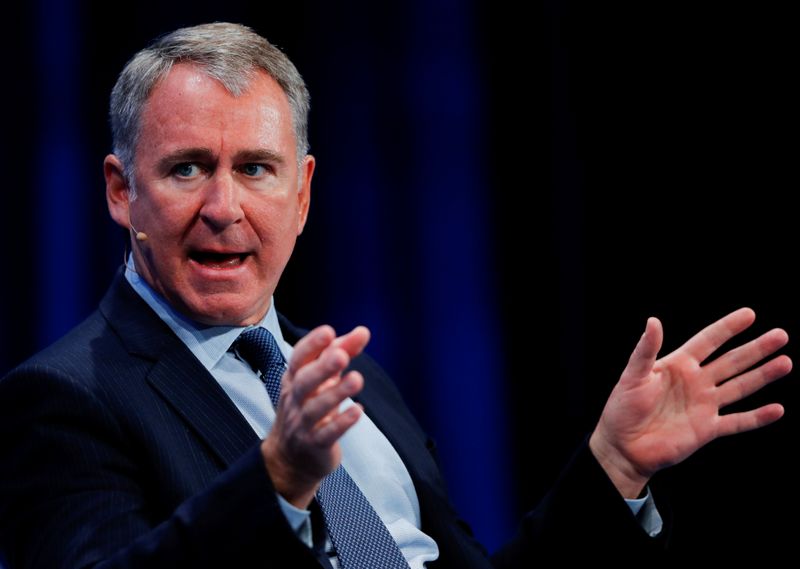By Svea Herbst-Bayliss and John McCrank
BOSTON/NEW YORK (Reuters) - The public will get the rare opportunity on Thursday to hear from big hedge fund managers who generally operate out of the spotlight, along with other players in the GameStop (NYSE:GME) trading frenzy who are scheduled to testify in the U.S. Congress.
Founders of hedge funds Citadel and Melvin Capital Management and trading app Robinhood are due to speak at the hearing which will be livestreamed https://financialservices.house.gov/calendar/eventsingle.aspx?EventID=407107. So are Keith Gill, who helped fuel the surge in GameStop with Reddit posts using the tag Roaring Kitty, and Reddit chief executive Steve Huffman.
The issues to be discussed are detailed in a memo https://docs.house.gov/meetings/BA/BA00/20210218/111207/HHRG-117-BA00-20210218-SD002.pdf.
GRIFFIN
Founder and CEO Ken Griffin https://www.citadel.com/leadership/kenneth-c-griffin, 52, built both the Citadel LLC hedge fund and market making business Citadel Securities by investing in technology, data and traders. The businesses operate separately from each other.
During the financial crisis Citadel's hedge fund stumbled badly to end 2008 with a 55% loss. The hypercompetitive Griffin rebounded, and in 2009 the flagship hedge fund gained 62%. Over its three decades the hedge fund has returned an average 19% a year.
In January, Citadel's hedge fund and securities trading businesses became central figures in the GameStop story for two reasons: Its order flow from Robinhood, the app many retail traders used to buy GameStop, and its role bailing out Melvin Capital after Melvin's short position on GameStop soured.
Citadel Securities, led by Peng Zhao, competes with other market makers for Robinhood’s order flow and receives a large percentage of orders based on execution quality. It also pays Robinhood to process orders it receives.
Griffin threw Melvin a $2 billion financial lifeline when it stumbled, saying he has "great confidence" in the team. In return he will get exposure to the fund's future returns in addition to a share of the revenue for years.
The move was reminiscent of other times Griffin took advantage of trouble. In 2006, he bought an ailing energy portfolio from Amaranth Advisors and in 2007 he snapped up Sowood Capital’s credit portfolio.
TENEV
Chief Executive Officer Vlad Tenev, 34, co-founded online broker Robinhood Markets Inc in 2013 with the goal of "democratizing finance for all," by offering commission-free trading.
Tenev was born in Bulgaria, grew up in the Washington, D.C. area, and earned a math degree at Stanford University in California. He dropped out of a PhD program at UCLA to join his Stanford roommate Baiju Bhatt in business ventures. The pair started two New York-based trading software companies before founding Robinhood back in California. Lockdowns during the coronavirus pandemic turbo-charged Robinhood's growth, especially among younger investors. The company boasts more than 13 million users and is valued at more than $20 billion, Reuters reported in December, with an IPO expected this year.
Lawmakers are likely to question Tenev about the trading app's decision to restrict trading during the GameStop frenzy, and Robinhood's role in the "gamification" of stock trading, which may promote risky trading among retail investors and has attracted scrutiny in Washington.
Tenev has faced heavy criticism from some Robinhood customers and has even been the target of death threats, according to Bloomberg. Robinhood declined to comment.
PLOTKIN
Gabriel Plotkin, one of the world's most successful hedge fund investors, stated his aim succinctly in August on a YouTube video: "Just get better every day." He stuck to that motto for years, with 30% average annual returns from 2014 to 2020 at Melvin Capital, the fund named after his grandfather, a small businessman.
Plotkin honed his craft at SAC Capital Advisors. He left when SAC pleaded guilty to insider trading charges but did not cut ties with founder Steven A. Cohen who was among his first investors and had $1 billion invested in Melvin last year.
Over time, Plotkin developed expensive tastes, say people who know him. Last year he paid $44 million for side-by-side properties overlooking Miami's Biscayne Bay and in 2019 he bought a minority stake in the Charlotte Hornets basketball team.
In January, the hedge fund lost 53% and its size shriveled from $12.5 billion to $8 billion largely because of a bet that GameStop's stock would fall. GameStop rose instead thanks to the Reddit rally.

Plotkin's short position in GameStop enraged some people so much that he received death threats. After GameStop's Reddit rally swamped Melvin with red ink, stunned investors, regulators and lawmakers want answers to Plotkin's risk management and how he had left his fund so vulnerable.